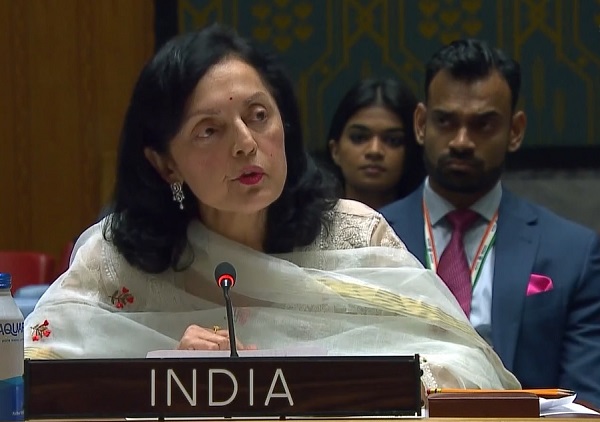
United Nations, (Asian independent) Calling for an immediate end to the violence and war in Ukraine, India has vowed to work to help blunt the economic fallout of the conflict.
“India’s approach will be to promote dialogue and diplomacy with an overarching aim to end the conflict and work with other partners to mitigate economic challenges emerging from the Russia-Ukraine conflict,” India’s Permanent Representative Ruchira Kamboj told the Security Council on Wednesday.
She said, “India continues to advocate for an immediate cessation of hostilities and an end to violence.”
“We encourage talks between Ukraine and Russia, (and) Prime Minister Narendra Modi has himself, more than once, spoken to them, in this regard,” Kamboj said after the Council heard a grim accounting of the war’s toll from Secretary-General Antonio Guterres.
Prime Minister Modi has spoken to Presidents Vladimir Putin of Russia and Volodymyr Zelensky of Ukraine urging them to hold a dialogue for a peaceful resolution of the conflict.
Since the invasion began in February, Guterres said, “thousands of civilians have been killed and injured, including hundreds of children. Countless others have lost their family members, friends and loved ones.”
He added, “The acceleration of already high food, fertiliser and fuel prices has triggered a global crisis that could drive millions more into extreme poverty, magnifying hunger and malnutrition.”
Keeping India’s fine balance in the conflict, Kamboj did not directly criticise Moscow or openly support Kiev while she also spoke of the war’s toll on Ukraine and New Delhi’s help to that country.
She said, “India remains deeply concerned over the situation in Ukraine. The conflict has resulted in loss of lives and countless miseries for its peoples, particularly for women, children and elderly, with millions becoming homeless and forced to take shelter in neighbouring countries.”
“India has just dispatched its twelfth consignment of humanitarian aid to Ukraine; consisting of 26 types of medicines, including ‘hemostatic bandages’ meant to stem bleeding of deep wounds in children and adults,” she said.
“This was a specific request by the Ukrainian side and we made sure that we reacted in the fastest possible time to meet this (need),” she added.
Rejecting the demands that India lifts its ban on foodgrains exports to the open market, Kamboj said, “Open markets must not become an argument to perpetuate inequity and promote discrimination”.
Pointing out India’s record of delivering vaccines and medicines around the world in times of crisis, she said, “I would like to assure this Council, that India will step forward whenever the global south is constrained on aspects of food, health and energy security and we will do this in a manner that is helpful to the global economy, and does not take undue advantage of countries in distress.”
India, she said, is responding positively to requests from many countries for foodgrains on the basis of equity, affordability and accessibility.
“In the last three months alone, India has exported more than 1.8 million tons of wheat to countries in need, including to Afghanistan, Myanmar, Sudan and Yemen,” she said.
She added that India was also increasing the production of agricultural inputs like fertilisers that were in short supply globally.
Under-Secretary-General Rosemary DiCarlo said that during the past 181 days the Office of the High Commissioner for Human Rights has recorded 13,560 civilian casualties: 5,614 killed and 7,946 injured.
“These figures are based on verified incidents; actual numbers are considerably higher,” she said.
“Today, exactly six months later, there is no end in sight to the conflict triggered by the Russian Federation’s invasion”, she said.







